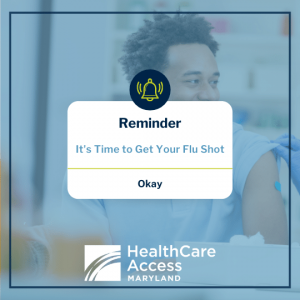 Today, September 22nd, marks the official start of the fall season. This also means influenza (flu) season is fast approaching. According to the Centers for Disease Control and Prevention (CDC), the exact timing of flu season can vary but cases tend to begin to rise in October and most often reach a peak between December and February. Health professionals agree that getting the flu vaccine every year is the best way to protect yourself and your family members from becoming ill.
Today, September 22nd, marks the official start of the fall season. This also means influenza (flu) season is fast approaching. According to the Centers for Disease Control and Prevention (CDC), the exact timing of flu season can vary but cases tend to begin to rise in October and most often reach a peak between December and February. Health professionals agree that getting the flu vaccine every year is the best way to protect yourself and your family members from becoming ill.
HealthCare Access Maryland’s partners at MedStar Health offer helpful guidance to understanding how to prevent the flu and the benefits of flu vaccination. Dr. Joshua Delp, Director of Pharmacy for MedStar Union Memorial and Good Samaritan Hospitals, provides answers to your commonly asked questions with research contribution from pharmacy student intern, Nasim Mavahebitabatabei.
When is the best time to get the flu shot?
September and October are generally good times to be vaccinated. Ideally, everyone should be vaccinated by the end of October/Early November.
Children can get vaccinated as soon as the annual vaccine becomes available—even if this is in July or August. Some children will need two doses. For those children, it is recommended to get the first dose as soon as the vaccine is available because the second dose needs to be given at least 4 weeks after the first.
However, for adults, especially those over 65, it is recommended not to be vaccinated early (July or August) because protection in this group may decrease over time. Early vaccination can be considered for people who are in the third trimester of pregnancy, because this can help protect their infants during the first months of life when they are too young to be vaccinated.1
Who should get a flu vaccine? Should children receive the vaccine?
Everyone 6 months of age and older should get an flu vaccine every season.
There are different flu shots approved for people of different ages. Everyone should get a vaccine that is appropriate for their age.
The flu vaccine is especially beneficial to individuals with chronic health conditions or who are pregnant. The flu is a potentially serious disease that can lead to hospitalization and sometimes even death. Complications of flu can include bacterial pneumonia, ear infections, sinus infections, and worsening of chronic medical conditions, such as congestive heart failure, asthma, or diabetes.
Vaccination has been shown to have many benefits including reducing the risk of flu illnesses, hospitalizations and even the risk of flu-related death in children. Flu vaccination has been associated with lower rates of some cardiac events among people with heart disease, and has been shown in studies to be associated with reduced hospitalization from a worsening chronic health condition. Vaccination is also shown to reduce a pregnant person’s risk of being hospitalized by an average of 40%.5
There are rare exceptions when a person should not get the flu shot, which include children younger than 6 months and people with severe-life-threatening allergies to any ingredient in a flu vaccine. People with egg allergies CAN receive licensed, recommended, age-appropriate influenza vaccines, and should consult with their doctor or pharmacist about egg-free flu vaccine options.4
Why do some people not feel well after getting a seasonal flu shot? What are the most common side effects and how long can you expect them to last?
Some people experience mild side effects after receiving the flu shot. If these reactions occur, a person will begin to feel side effects soon after vaccination and can generally expect them to last 1-2 days. The most common reactions people have to the flu vaccine are considerably less severe than the symptoms resulting from the actual flu illness.2
Side effects vary by the type of flu vaccine a person receives:
- Inactivated Flu Vaccine: soreness, redness and swelling where the shot was given, fever, muscle aches, and headache. There may be a very small increased risk of Guillain-Barré Syndrome (GBS) after inactivated influenza vaccine (the flu shot).3
- LAIV vaccine: runny nose or nasal congestion, wheezing and headache can happen after vaccination. Vomiting, muscle aches, fever, sore throat, and cough are other possible side effects.
- Nasal spray vaccine: runny nose, wheezing, headache, vomiting, muscle aches, fever, sore throat and cough.
Do you need to wait to receive a flu shot if you’ve recently had a COVID-19 vaccine?
Flu vaccines and COVID-19 vaccines can be given at the same time. You can get a COVID-19 vaccine and other vaccines at the same visit. Experience with other vaccines has shown that the way our bodies develop protection, known as an immune response, after getting vaccinated and possible side effects of vaccines are generally the same when given alone or with other vaccines.
For older adults, this is very important as necessary preventative vaccinations such as the shingles, influenza, COVID and pneumococcal vaccine may be given without concern.
How effective is the flu vaccine at preventing illness? Are there other steps you can take to help protect yourself from the flu?
The CDC conducts studies each year to determine how well flu vaccines protect against flu. While vaccine effectiveness can vary, recent studies show that flu vaccination reduces the risk of flu illness by between 40% and 60% among the overall population during seasons when most circulating flu viruses are well-matched to those used to make flu vaccines. While some people who get a flu vaccine may still get sick, flu vaccination has been shown in several studies to reduce severity of illness.4
At least two factors play an important role in determining the likelihood that vaccination will protect a person from flu illness: 1) characteristics of the person being vaccinated (such as their age and health), and 2) how well the vaccines “match” the flu viruses spreading in the community.5
Getting a flu vaccine each year is the best way to prevent the flu. In addition to getting the flu shot, people should practice healthy habits and take preventative actions every day to prevent the spread of flu, including covering coughs, washing your hands often, and avoiding people who are sick.
If you do become sick with the flu, antiviral drugs are an important second line of defense to treat the flu. These drugs are not a substitute for vaccination and must be prescribed by a health care provider.5
Flu vaccines are now available. Check with your primary care doctor or community pharmacy for appointments to get your flu vaccine as soon as possible. If you have additional questions about the flu vaccine you or your child should receive, be sure to check with your doctor.
Additional Information and References
- https://www.cdc.gov/flu/season/faq-flu-season-2021-2022.htm
- https://www.cdc.gov/flu/prevent/misconceptions.htm
- https://www.cdc.gov/vaccines/vac-gen/side-effects.htm
- https://www.cdc.gov/flu/prevent/keyfacts.htm
- https://www.cdc.gov/flu/vaccines-work/vaccineeffect.htm
- https://www.cdc.gov/coronavirus/2019-ncov/vaccines/faq.html
- https://www.cdc.gov/flu/prevent/whoshouldvax.htm






